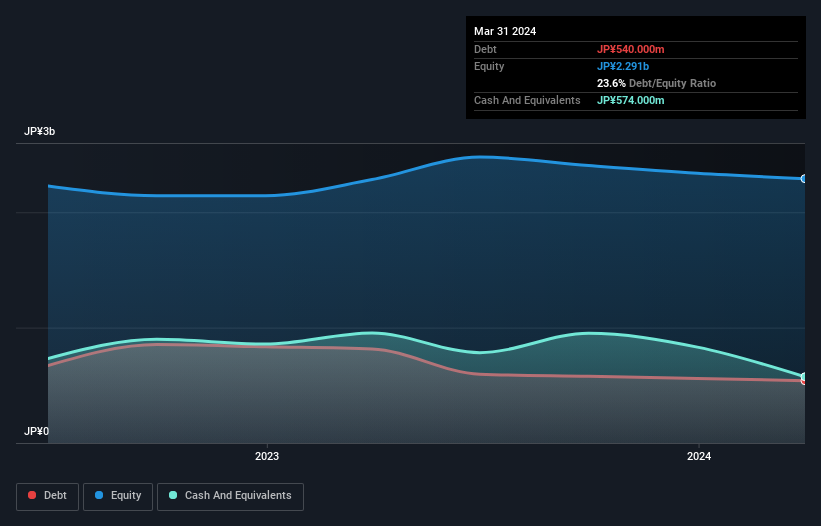
David Iben put it well when he said, 'Volatility is not a risk we care about. What we care about is avoiding the permanent loss of capital.' It's only natural to consider a company's balance sheet when you examine how risky it is, since debt is often involved when a business collapses. We note that JTEC Corporation (TSE:3446) does have debt on its balance sheet. But is this debt a concern to shareholders?
Why Does Debt Bring Risk?
Debt and other liabilities become risky for a business when it cannot easily fulfill those obligations, either with free cash flow or by raising capital at an attractive price. Part and parcel of capitalism is the process of 'creative destruction' where failed businesses are mercilessly liquidated by their bankers. However, a more usual (but still expensive) situation is where a company must dilute shareholders at a cheap share price simply to get debt under control. By replacing dilution, though, debt can be an extremely good tool for businesses that need capital to invest in growth at high rates of return. The first step when considering a company's debt levels is to consider its cash and debt together.
Check out our latest analysis for JTEC
What Is JTEC's Net Debt?
As you can see below, JTEC had JP¥540.0m of debt at March 2024, down from JP¥815.0m a year prior. But on the other hand it also has JP¥574.0m in cash, leading to a JP¥34.0m net cash position.

How Healthy Is JTEC's Balance Sheet?
The latest balance sheet data shows that JTEC had liabilities of JP¥385.0m due within a year, and liabilities of JP¥477.0m falling due after that. On the other hand, it had cash of JP¥574.0m and JP¥167.0m worth of receivables due within a year. So its liabilities total JP¥121.0m more than the combination of its cash and short-term receivables.
Having regard to JTEC's size, it seems that its liquid assets are well balanced with its total liabilities. So while it's hard to imagine that the JP¥8.19b company is struggling for cash, we still think it's worth monitoring its balance sheet. While it does have liabilities worth noting, JTEC also has more cash than debt, so we're pretty confident it can manage its debt safely. The balance sheet is clearly the area to focus on when you are analysing debt. But ultimately the future profitability of the business will decide if JTEC can strengthen its balance sheet over time. So if you want to see what the professionals think, you might find this free report on analyst profit forecasts to be interesting.
In the last year JTEC wasn't profitable at an EBIT level, but managed to grow its revenue by 3.1%, to JP¥1.6b. That rate of growth is a bit slow for our taste, but it takes all types to make a world.
So How Risky Is JTEC?
Although JTEC had an earnings before interest and tax (EBIT) loss over the last twelve months, it generated positive free cash flow of JP¥256m. So taking that on face value, and considering the net cash situation, we don't think that the stock is too risky in the near term. Until we see some positive EBIT, we're a bit cautious of the stock, not least because of the rather modest revenue growth. There's no doubt that we learn most about debt from the balance sheet. However, not all investment risk resides within the balance sheet - far from it. For example, we've discovered 2 warning signs for JTEC that you should be aware of before investing here.
At the end of the day, it's often better to focus on companies that are free from net debt. You can access our special list of such companies (all with a track record of profit growth). It's free.
If you're looking to trade JTEC, open an account with the lowest-cost platform trusted by professionals, Interactive Brokers.
With clients in over 200 countries and territories, and access to 160 markets, IBKR lets you trade stocks, options, futures, forex, bonds and funds from a single integrated account.
Enjoy no hidden fees, no account minimums, and FX conversion rates as low as 0.03%, far better than what most brokers offer.
Sponsored ContentNew: Manage All Your Stock Portfolios in One Place
We've created the ultimate portfolio companion for stock investors, and it's free.
• Connect an unlimited number of Portfolios and see your total in one currency
• Be alerted to new Warning Signs or Risks via email or mobile
• Track the Fair Value of your stocks
Have feedback on this article? Concerned about the content? Get in touch with us directly. Alternatively, email editorial-team (at) simplywallst.com.
This article by Simply Wall St is general in nature. We provide commentary based on historical data and analyst forecasts only using an unbiased methodology and our articles are not intended to be financial advice. It does not constitute a recommendation to buy or sell any stock, and does not take account of your objectives, or your financial situation. We aim to bring you long-term focused analysis driven by fundamental data. Note that our analysis may not factor in the latest price-sensitive company announcements or qualitative material. Simply Wall St has no position in any stocks mentioned.
Have feedback on this article? Concerned about the content? Get in touch with us directly. Alternatively, email editorial-team@simplywallst.com
About TSE:3446
JTEC
Designs, manufactures, and sells X-ray mirrors for synchrotron facilities in Japan.
High growth potential with excellent balance sheet.
Market Insights
Community Narratives



